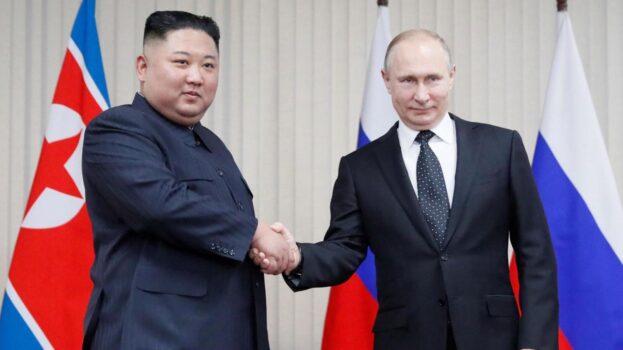 Russian President Vladimir Putin is set to make a rare foreign trip to North Korea, underscoring the strengthening alliance between the two nations amid ongoing geopolitical tensions. The visit, scheduled for June 18-19, aims to solidify ties with North Korea, which has been a steadfast supporter of Moscow’s war in Ukraine.
Russian President Vladimir Putin is set to make a rare foreign trip to North Korea, underscoring the strengthening alliance between the two nations amid ongoing geopolitical tensions. The visit, scheduled for June 18-19, aims to solidify ties with North Korea, which has been a steadfast supporter of Moscow’s war in Ukraine.
North Korean media announced Putin’s visit on Monday, highlighting the significance of the trip for both countries. In anticipation, North Korean leader Kim Jong Un lauded the deepening relationship between Moscow and Pyongyang in a June 12 message celebrating Russia’s National Day, calling their bond an “unbreakable relationship of comrades-in-arms.”
The upcoming visit follows Kim’s trip to Russia’s Far East in September, where he met with Putin and toured several military sites. This meeting raised concerns in the West about a potential arms alliance between the two nations. While Russian and North Korean officials confirmed discussions on enhancing defense ties, specific details were not disclosed.
Both Russia and North Korea are currently engaged in separate confrontations with the United States—Russia over its invasion of Ukraine and North Korea over its advancing nuclear program. Despite allegations of arms transfers, both countries have denied any violations of United Nations Security Council resolutions.
In March, South Korean Defense Minister Shin Wonsik reported that North Korea had already sent approximately 7,000 containers filled with munitions and military equipment to Russia. In exchange, North Korea received over 9,000 containers from Russia, likely containing aid.
Andrei Lankov, a professor at Kookmin University, noted that Russia’s interest in cooperating with North Korea is tied to the ongoing military conflict in Ukraine. “The strategic value of North Korea, in case the phase of active hostilities in Ukraine ends, is most likely not so great,” Lankov said. He added that during the military conflict, there would be active interaction regarding simple arms trade, but significant military-technical assistance or advanced military technology transfers to North Korea were unlikely.
This visit marks Putin’s second trip to North Korea, his first being in July 2000 when he met with Kim’s father, Kim Jong Il, shortly after his initial election as president.
Moscow has expressed its appreciation for Pyongyang’s support of Russia’s military actions in Ukraine and noted their “close and fruitful cooperation” at the United Nations and other international forums. Russia, alongside China, has repeatedly blocked attempts by the U.S. and its allies to impose new U.N. sanctions on North Korea in response to its banned ballistic missile tests.
In March, a Russian veto at the United Nations halted the monitoring of U.N. sanctions against North Korea over its nuclear program, prompting accusations from Western nations that Moscow seeks to evade scrutiny while allegedly purchasing weapons from Pyongyang for use in Ukraine.
Earlier this year, Putin sent Kim a high-end Aurus Senat limousine, which he showcased during their September summit. Observers noted that the shipment likely violated a U.N. resolution designed to pressure North Korea to abandon its nuclear weapons program by banning the supply of luxury items to the country.
Putin’s visit to North Korea underscores the ongoing geopolitical realignments and the deepening ties between Moscow and Pyongyang in the face of Western opposition.

White House Says Military Option Open On Greenland Acquisition
Trump Calls Case Against Maduro “Infallible” Ahead Of U.S. Court Appearance
South Africa Raids U.S. Refugee Processing Centre, Arrests Seven Kenyans
Time Magazine Names AI Visionaries ‘Person of the Year’